exercises(老师用最终修改版) (1)
最新Exercises
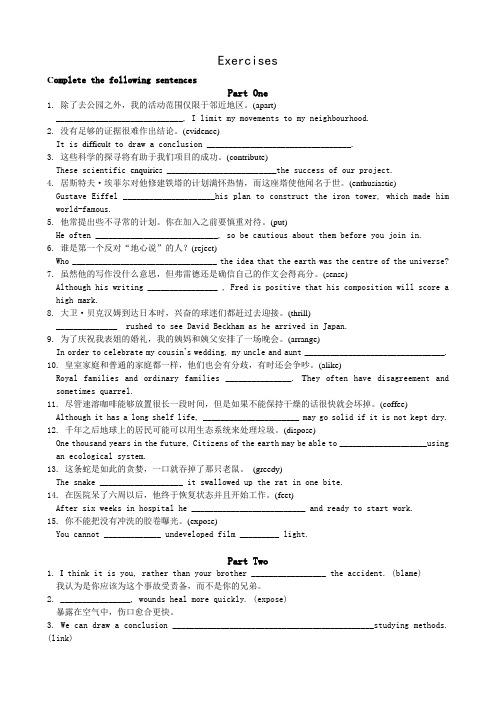
ExercisesC omplete the following sentencesPart One1. 除了去公园之外,我的活动范围仅限于邻近地区。
(apart)_____________________________, I limit my movements to my neighbourhood.2. 没有足够的证据很难作出结论。
(evidence)It is difficult to draw a conclusion _________________________________.3. 这些科学的探寻将有助于我们项目的成功。
(contribute)These scientific enquiries _________________________the success of our project.4. 居斯特夫·埃菲尔对他修建铁塔的计划满怀热情,而这座塔使他闻名于世。
(enthusiastic)Gustave Eiffel _____________________his plan to construct the iron tower, which made him world-famous.5. 他常提出些不寻常的计划。
你在加入之前要慎重对待。
(put)He often ____________________________, so be cautious about them before you join in.6. 谁是第一个反对“地心说”的人?(reject)Who _________________________________ the idea that the earth was the centre of the universe?7. 虽然他的写作没什么意思,但弗雷德还是确信自己的作文会得高分。
(sense)Although his writing ________________ , Fred is positive that his composition will score a high mark.8. 大卫·贝克汉姆到达日本时,兴奋的球迷们都赶过去迎接。
5.【新教材完结】2024新教材七上Unit4单词讲义 (教师版)
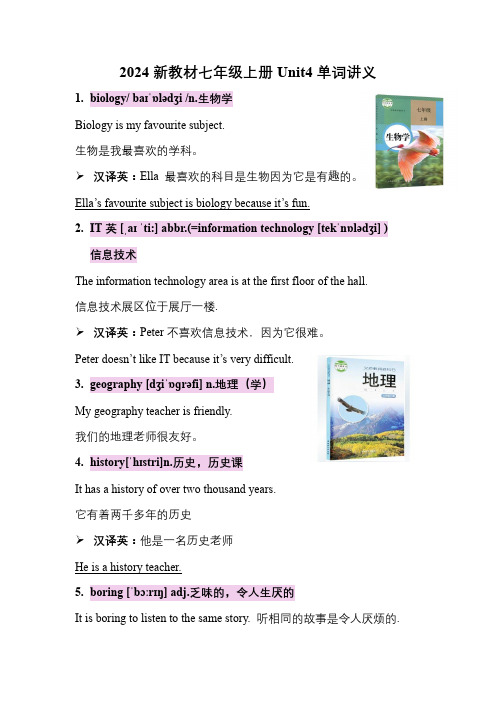
2024新教材七年级上册Unit4单词讲义1.biology/ baɪˈɒlədʒi /n.生物学Biology is my favourite subject.生物是我最喜欢的学科。
➢汉译英:Ella 最喜欢的科目是生物因为它是有趣的。
Ella’s favourite subject is biology because it’s fun.2.IT英[ˌaɪ ˈti:] abbr.(=information technology [tekˈnɒlədʒi] )信息技术The information technology area is at the first floor of the hall.信息技术展区位于展厅一楼.➢汉译英:Peter不喜欢信息技术,因为它很难。
Peter doesn’t like IT because it’s very difficult.3.geography[dʒiˈɒɡrəfi] n.地理(学)My geography teacher is friendly.我们的地理老师很友好。
4.history[ˈhɪstri]n.历史,历史课It has a history of over two thousand years.它有着两千多年的历史➢汉译英:他是一名历史老师He is a history teacher.5.boring[ˈbɔːrɪŋ] adj.乏味的,令人生厌的It is boring to listen to the same story. 听相同的故事是令人厌烦的.The movie is boring. 这部电影是乏味的。
➢汉译英:Ella 不喜欢历史,因为它是乏味的。
Ella doesn’t like history because it’s boring.➢辨析形容词:boring /bored●"bored" 通常用来形容人,强调的是人的内心感受。
exercises是什么意思短语造句
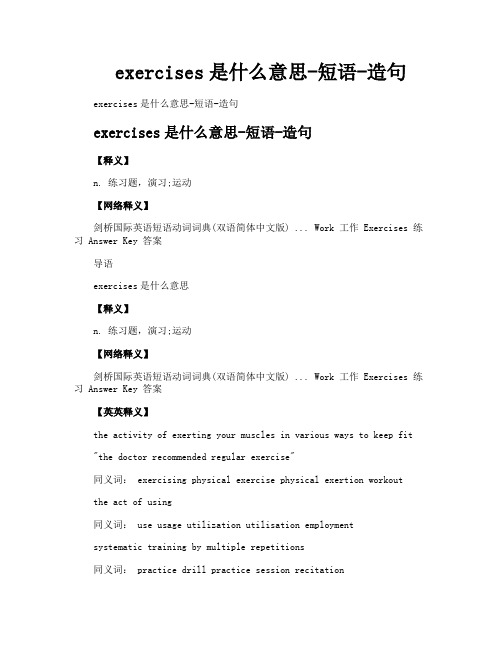
exercises是什么意思-短语-造句exercises是什么意思-短语-造句exercises是什么意思-短语-造句【释义】n. 练习题,演习;运动【网络释义】剑桥国际英语短语动词词典(双语简体中文版) ... Work 工作 Exercises 练习 Answer Key 答案导语exercises是什么意思【释义】n. 练习题,演习;运动【网络释义】剑桥国际英语短语动词词典(双语简体中文版) ... Work 工作 Exercises 练习 Answer Key 答案【英英释义】the activity of exerting your muscles in various ways to keep fit"the doctor recommended regular exercise"同义词: exercising physical exercise physical exertion workoutthe act of using同义词: use usage utilization utilisation employmentsystematic training by multiple repetitions同义词: practice drill practice session recitationa task performed or problem solved in order to develop skill or understanding同义词: example(usually plural) a ceremony that involves processions and speeches"academic exercises"v.put to use同义词: exertcarry out or practice; as of jobs and professions同义词: practice practise dogive a workout to"Some parents exercise their infants"同义词: work work outdo physical exercise同义词: work outlearn by repetition同义词: drill practice practise【词组短语】eye exercises 眼保健操【双语例句】He believes in getting plenty of exercise .他相信多做运动必有好处。
新实用标准大学英语(第二版)综合教程1问题详解解析汇报截图和课文翻译U1分解
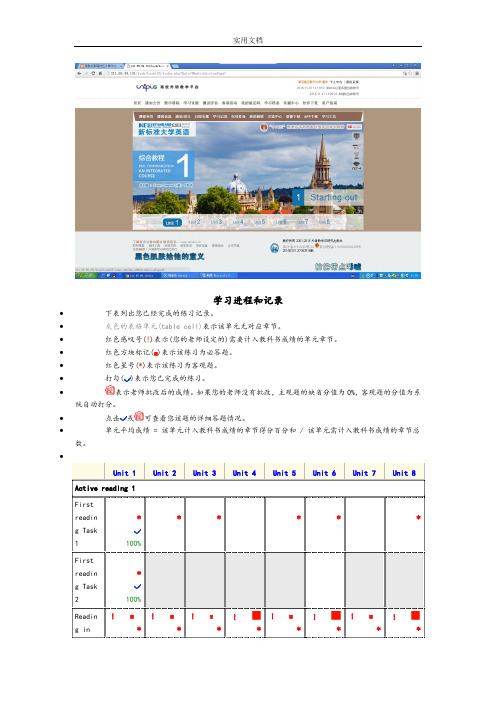
下表列出您已经完成的练习记录。
灰色的表格单元(table cell)表示该单元无对应章节。
红色感叹号(!)表示(您的老师设定的)需要计入教科书成绩的单元章节。
红色方块标记( )表示该练习为必答题。
红色星号(*)表示该练习为客观题。
打勾( )表示您已完成的练习。
表示老师批改后的成绩。如果您的老师没有批改,主观题的缺省分值为0%,客观题的分值为系统自动打分。
! *
100%
! *
89%
! *
! *
! *
! *
! *
! *
Reading in detail: Vocabulary exercises Task 3
! *
100%
! *
100%
! *
! *
! *
! *
! *
! *
Reading in detail: Vocabulary exercises Task 4
18那名女生名叫苏菲,和我一样,也是英语文学专业的学生。她看起来惊人地聪明。听完讲座后我们一起闲聊。她告诉我在间隔年里,她已经把这学期书单上的书全都读完了。她令人敬佩,我觉得自己太无知了,我甚至不配跟她呼吸同样的空气。
19妈妈打来电话,问我睡得好不好。
星期四
20今天有新生集会。苏菲和我跑去看我们能加入多少个俱乐部。我们俩都认为我们应该多结交朋友,所以我报名参加了交谊舞俱乐部、人工智能协会、手铃俱乐部和极限运动俱乐部。苏菲则报名参加了业余剧社和莫扎特合唱团。我不知道苏菲和我还能不能继续做好朋友。
23今晚学生会举办“社团之夜”晚会,可我已经没有干净衣服穿了。我可不清楚把脏衣服扔进脏衣篮之后到它们干干净净、熨烫笔挺并叠好放进衣柜之前都发生了什么。也许妈妈快来电话了。
做早操的短语英语
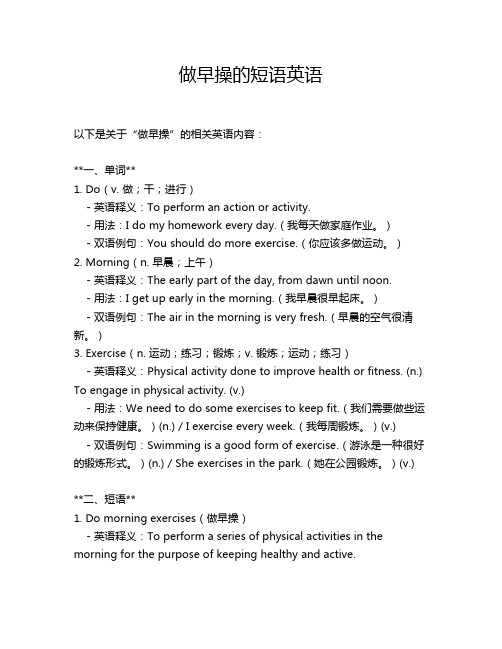
做早操的短语英语以下是关于“做早操”的相关英语内容:**一、单词**1. Do(v. 做;干;进行)- 英语释义:To perform an action or activity.- 用法:I do my homework every day.(我每天做家庭作业。
)- 双语例句:You should do more exercise.(你应该多做运动。
)2. Morning(n. 早晨;上午)- 英语释义:The early part of the day, from dawn until noon.- 用法:I get up early in the morning.(我早晨很早起床。
)- 双语例句:The air in the morning is very fresh.(早晨的空气很清新。
)3. Exercise(n. 运动;练习;锻炼;v. 锻炼;运动;练习)- 英语释义:Physical activity done to improve health or fitness. (n.) To engage in physical activity. (v.)- 用法:We need to do some exercises to keep fit.(我们需要做些运动来保持健康。
)(n.) / I exercise every week.(我每周锻炼。
)(v.)- 双语例句:Swimming is a good form of exercise.(游泳是一种很好的锻炼形式。
)(n.) / She exercises in the park.(她在公园锻炼。
)(v.)**二、短语**1. Do morning exercises(做早操)- 英语释义:To perform a series of physical activities in the morning for the purpose of keeping healthy and active.- 用法:Students usually do morning exercises on the playground.(学生们通常在操场做早操。
Unit 2 Physical Exercises 教学设计

Unit 2 Physical ExercisesPart A◆语言知识目标1.学习单词:between,women,healthy,exercise,always,often,sometimes等。
2.学习句型:He often/always does sth.Sometimes he does sth.3.学习成节辅音/ven/,/son/和/cle/等在单词中的发音。
4.学习韵律诗:Does He Often Exercise?5.功能:使用频度副词谈论日常行为习惯。
◆语言技能目标1.能在具体的语境中理解频度副词often,always和sometimes的意义和用法。
2.能运用频度副词谈论自己或他人的日常行为习惯。
3.能制订运动计划表,并说给老师和同学们听。
◆情感态度加强锻炼,增强体质。
教学重点:本单元的话题是体育锻炼。
A部分主要谈论彼得的日常体育锻炼情况,复习第三人称单数一般现在时的谓语形式,同时学习表示频率的词汇always,often,sometimes;B部分主要描述一场篮球比赛,复习现在进行时。
◆教学重点:单词:between、women、healthy、exercise、always、often、sometimes等句型:He often/always does sth. Sometimes he does sth.◆教学难点:能在具体情境中理解频率副词often、always和sometimes的意义和用法。
能运用频率副词谈论自己或他人的日常行为。
◆教具准备:1.单词卡片:exercise,between等。
2.有关运动项目的图片,如:游泳、打篮球、踢足球等。
3.录音机或教学光盘。
教学过程Step 1 Warming up1.师生互致问候。
2.教师出示两条谚语:Early to bed,early to rise,makes you healthy,wealthy and wise.(早睡早起身体好,财富、才智少不了。
1、汉译英教师版——拔高
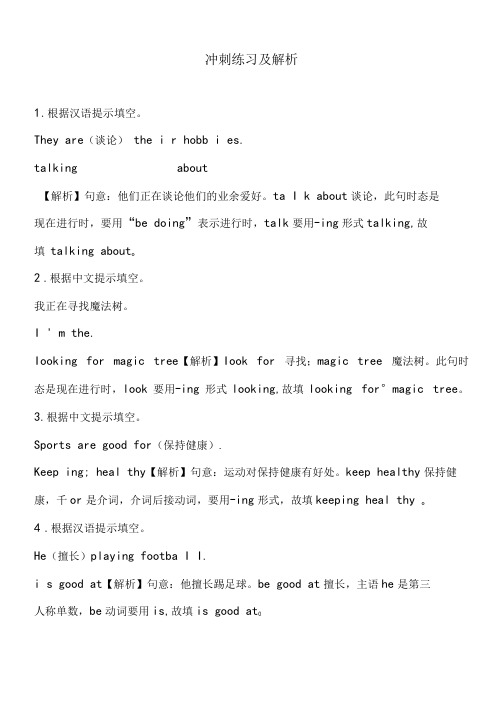
冲刺练习及解析1.根据汉语提示填空。
They are(谈论)the i r hobb i es.talking about【解析】句意:他们正在谈论他们的业余爱好。
ta I k about谈论,此句时态是现在进行时,要用“be doing”表示进行时,talk要用-ing形式talking,故填talking about o2.根据中文提示填空。
我正在寻找魔法树。
I ' m the.Iooking for magic tree【解析】Iook for 寻找;magic tree 魔法树。
此句时态是现在进行时,look要用-ing形式looking,故填looking for°magic tree。
3.根据中文提示填空。
Sports are good for(保持健康).Keep ing; heal thy【解析】句意:运动对保持健康有好处。
keep healthy保持健康,千or是介词,介词后接动词,要用-ing形式,故填keeping heal thy o4.根据汉语提示填空。
He(擅长)playing footba I I.i s good at【解析】句意:他擅长踢足球。
be good at擅长,主语he是第三人称单数,be动词要用is,故填is good at05.汉译英。
比尔打算教我们唱一首中文歌曲。
【答案】Bi I I is going to teach us to sing a Chinese song.6.汉译英。
有时他们会一起出去。
【答案】Sometimes they go out together.7.汉译英。
泰德倒了垃圾。
【答案】Ted took out the rubbi sh.8.汉译英。
泰德给我看了他的邮票。
【答案】Ted showed me h i s stamps.9.汉译英。
有如此多有趣的事情要做。
【答案】There are so much interesting things to do.10.根据所给汉语提示填空。
四年级上册英语书28页内容

UNIT 1 Why are you so happy?你为什么如此的开心?Lesson 11.重点词汇again再次 glad高兴的 because因为 back 返回happy开心的 angry生气的 tired累的 messy脏乱的2.重点词组so do I 我也是 so happy如此的开心3.重点句型Why are you so happy?你为什么如此的开心?Because we are back at school. 因为我们回到了学校。
He played too hard. 他玩的太累了。
Exercise 1请把每个单词写五遍,并在括号里写一遍汉语意思。
())()()()(()()Exercise 2 汉英翻译,要求默写。
我也是 ______________ 如此的开心 ______________Exercise 3 根据汉语意思默写单词生气的______________ 开心的______________ 累的______________ 脏乱的______________ 回来______________ 高兴的______________ Exercise 4 翻译句子1.你为什么如此的开心?2.因为我们回到了学校3他玩的太累了。
Lesson 21.重点词汇missing丢失 hope希望 sad伤心的 surprised惊喜的excited兴奋的 gold黄金2.重点词组come back回来3.重点句型Why do you look so sad?你为什么看起来如此的伤心?Because my dog is missing.因为我的狗丢失了。
He will come back soon. 他不久后就会回来的。
Exercise 1请把每个单词写五遍,并在括号里写一遍汉语意思。
()()(()()()Exercise 2 汉英翻译,要求默写。
回来 ______________ 兴奋的 ______________Exercise 3 根据汉语意思默写单词丢失______________ 伤心的______________ 惊喜的______________ 兴奋的______________ 黄金______________Exercise 4 翻译句子1.你为什么如此的伤心?2.因为我的狗丢失了。
exercises(老师用最终修改版)
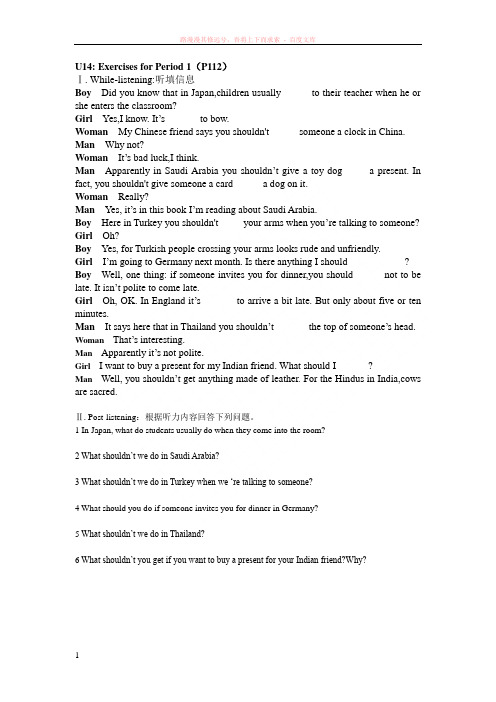
U14: Exercises for Period 1(P112)Ⅰ.While-listening:听填信息Boy Did you know that in Japan,children usually _____ to their teacher when he or she enters the classroom?Girl Yes,I know. It’s ______ to bow.Woman My Chinese friend says you shouldn't _____ someone a clock in China. Man Why not?Woman It’s bad luck,I think.Man Apparently in Saudi Arabia you shouldn’t give a toy dog ____ a present. In fact, you shouldn't give someone a card _____ a dog on it.Woman Really?Man Yes, it’s in this book I’m reading about Saudi Arabia.Boy Here in Turkey you shouldn't ____ your arms when you’re talking to someone? Girl Oh?Boy Yes, for Turkish people crossing your arms looks rude and unfriendly.Girl I’m going to Germany next month. Is there anything I should ___________? Boy Well, one thing: if someone invites you for dinner,you should _____ not to be late. It isn’t polite to come late.Girl Oh, OK. In England it’s ______ to arrive a bit late. But only about five or ten minutes.Man It says here that in Thailand you shouldn’t ______ the top of someone’s head. Woman That’s interesting.Man Apparently it’s not polite.Girl I want to buy a present for my Indian friend. What should I ______?Man Well, you shouldn’t get anything made of leather. For the Hindus in India,cows are sacred.Ⅱ.Post-listening:根据听力内容回答下列问题。
exercise的用法总结大全

exercise的用法总结大全exercise表示锻炼,关于它的用法,我已经帮你整理好了!释义exercise英[?eks?sa?z] 美[?eks?rsa?z]n. 运动;练习;运用;操练;礼拜;典礼vt. 锻炼;练习;使用;使劳碌;使惊恐vi. 运动;练习[ 过去式exercised 过去分词exercised 如今分词exercising 复数exercises 第三人称单数exercises ]词组〔短语〕take exercise 做运动;做〔体操〕physical exercise 〔体育运动〕;身体操练regular exercise 常规性的锻炼;经常操练,按时训练aerobic exercise 有氧运动do exercise 锻炼;做运动;做练习词语辨析practice, exercises, exercisepractice (反复做的)练习Practice makes perfect.exercises 练习(可数),exercise 运动,锻炼(不行数),用法exercise可用作及物动词,也可用作不及物动词。
(1)用作及物动词时,接名词或代词作宾语。
He tried to exercise his stiff leg.他努力锻炼他那条僵直的腿。
We should exercise our strength.我们应当锻炼体力。
(2)用作不及物动词He exercised and his health gradually improved.他进行锻炼,身体慢慢好了起来。
You dont exercise enough.你运动不够。
exercise作“练习”解时,其后常接“反身代词+in+ n./v -ing”,其主语既是动作的执行者,又是动作的承受者。
exercise用作名词的基本意思是“运动,锻炼”。
指适用于正常人的一般性的以健身为目的的“体质锻炼”,也可指脑力方面的锻炼,还可指适用于运动员的“专业训练”。
高一英语(译林牛津版) 必修一教师用书 Unit1 School life
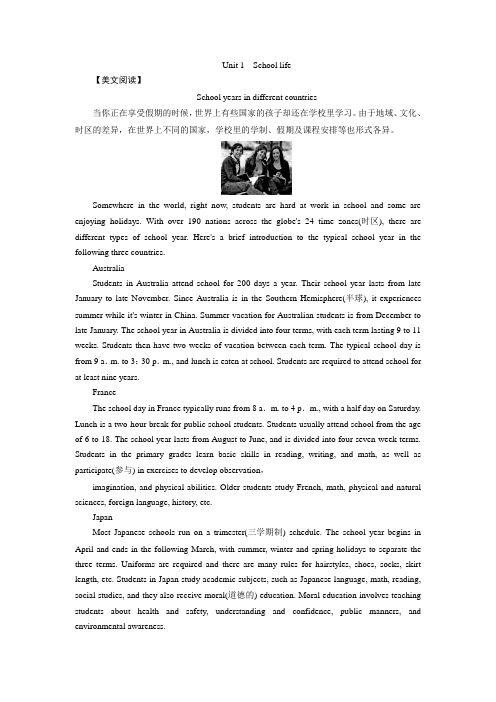
Unit 1School life【美文阅读】School years in different countries当你正在享受假期的时候,世界上有些国家的孩子却还在学校里学习。
由于地域、文化、时区的差异,在世界上不同的国家,学校里的学制、假期及课程安排等也形式各异。
Somewhere in the world, right now, students are hard at work in school and some are enjoying holidays. With over 190 nations across the globe's 24 time zones(时区), there are different types of school year. Here's a brief introduction to the typical school year in the following three countries.AustraliaStudents in Australia attend school for 200 days a year. Their school year lasts from late January to late November. Since Australia is in the Southern Hemisphere(半球), it experiences summer while it's winter in China. Summer vacation for Australian students is from December to late January. The school year in Australia is divided into four terms, with each term lasting 9 to 11 weeks. Students then have two weeks of vacation between each term. The typical school day is from 9 a.m. to 3:30 p.m., and lunch is eaten at school. Students are required to attend school for at least nine years.FranceThe school day in France typically runs from 8 a.m. to 4 p.m., with a half day on Saturday. Lunch is a two-hour break for public school students. Students usually attend school from the age of 6 to 18. The school year lasts from August to June, and is divided into four seven-week terms. Students in the primary grades learn basic skills in reading, writing, and math, as well as participate(参与) in exercises to develop observation,imagination, and physical abilities. Older students study French, math, physical and natural sciences, foreign language, history, etc.JapanMost Japanese schools run on a trimester(三学期制) schedule. The school year begins in April and ends in the following March, with summer, winter and spring holidays to separate the three terms. Uniforms are required and there are many rules for hairstyles, shoes, socks, skirt length, etc. Students in Japan study academic subjects, such as Japanese language, math, reading, social studies, and they also receive moral(道德的) education. Moral education involves teaching students about health and safety, understanding and confidence, public manners, and environmental awareness.From:http://www.factmonster. com【诱思导学】1.What is the difference between our school year and theirs?【答案】We have different terms. There are usually two terms in our school year while in both Australia and France, they have four terms and Japan has three.2.Do you think our present school year is good or not, and why?【答案】It is hard to say good or bad because different countries lie in different time zones, they enjoy different holidays and different schools.3.Do you want to know the school life in the UK?Why or why not?【答案】Yes. Because the school life in the UK interests me very much./No. Because I have no interest in the school life there. It's none of my business.Period ⅠPreviewing(教师用书独具)●教学目标本课时主要是通过学生对学案所给出的内容的学习,了解本课文中所出现的词汇,初步了解课文以及相关的背景知识,对下一堂课课文的全面理解起到一个铺垫作用。
2019年12月英语四级语法用法辨析:exercise的用法
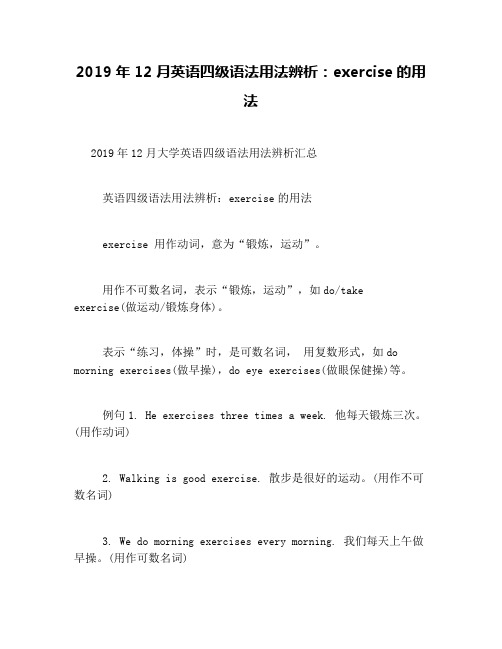
2019年12月英语四级语法用法辨析:exercise的用法2019年12月大学英语四级语法用法辨析汇总英语四级语法用法辨析:exercise的用法exercise 用作动词,意为“锻炼,运动”。
用作不可数名词,表示“锻炼,运动”,如do/takeexercise(做运动/锻炼身体)。
表示“练习,体操”时,是可数名词,用复数形式,如do morning exercises(做早操),do eye exercises(做眼保健操)等。
例句1. He exercises three times a week. 他每天锻炼三次。
(用作动词)2. Walking is good exercise. 散步是很好的运动。
(用作不可数名词)3. We do morning exercises every morning. 我们每天上午做早操。
(用作可数名词)我们再看两道题:1. He is very strong because he often e___ (依据句意及首字母完成单词).答案:exercises解题思路:exercise作动词时意为“运动,锻炼”。
在这个句子中缺少的是谓语动词,主语是表示第三人称单数的he,所以用动词的第三人称单数形式,因此填exercises。
2. It's good for us to do ___ every day.A. eye exerciseB. eye exercisesC. eyes exerciseD. eyes exercises答案:B解题思路:exercise作“体操,运动”讲时常为exercises,选项A、C被排除,在英语中用名词修饰名词时,前边的名词须用单数形式,故选B。
八年级英语导学案答案
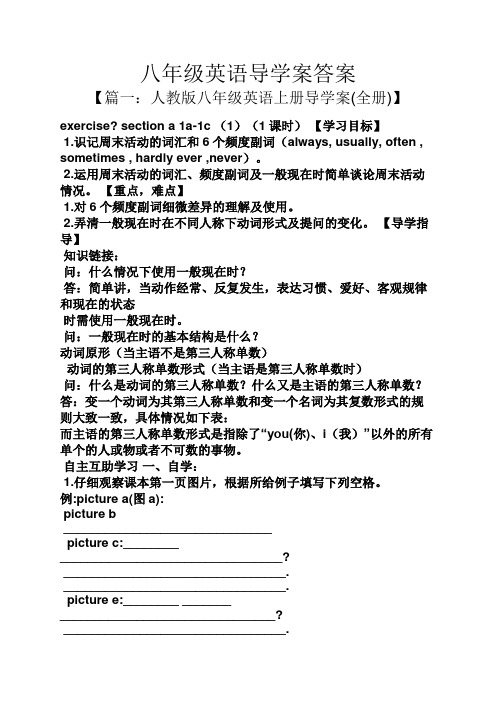
八年级英语导学案答案【篇一:人教版八年级英语上册导学案(全册)】exercise? section a 1a-1c (1)(1课时)【学习目标】1.识记周末活动的词汇和6个频度副词(always, usually, often , sometimes , hardly ever ,never)。
2.运用周末活动的词汇、频度副词及一般现在时简单谈论周末活动情况。
【重点,难点】1.对6个频度副词细微差异的理解及使用。
2.弄清一般现在时在不同人称下动词形式及提问的变化。
【导学指导】知识链接:问:什么情况下使用一般现在时?答:简单讲,当动作经常、反复发生,表达习惯、爱好、客观规律和现在的状态时需使用一般现在时。
问:一般现在时的基本结构是什么?动词原形(当主语不是第三人称单数)动词的第三人称单数形式(当主语是第三人称单数时)问:什么是动词的第三人称单数?什么又是主语的第三人称单数?答:变一个动词为其第三人称单数和变一个名词为其复数形式的规则大致一致,具体情况如下表:而主语的第三人称单数形式是指除了“you(你)、i(我)”以外的所有单个的人或物或者不可数的事物。
自主互助学习一、自学:1.仔细观察课本第一页图片,根据所给例子填写下列空格。
例:picture a(图a):picture b______________________________picture c:________________________________________?________________________________.________________________________.picture e:________ ______________________________________?________________________________.2.根据汉语提示,完成下列其他weekend activity (周末活动)短语。
exercise的用法
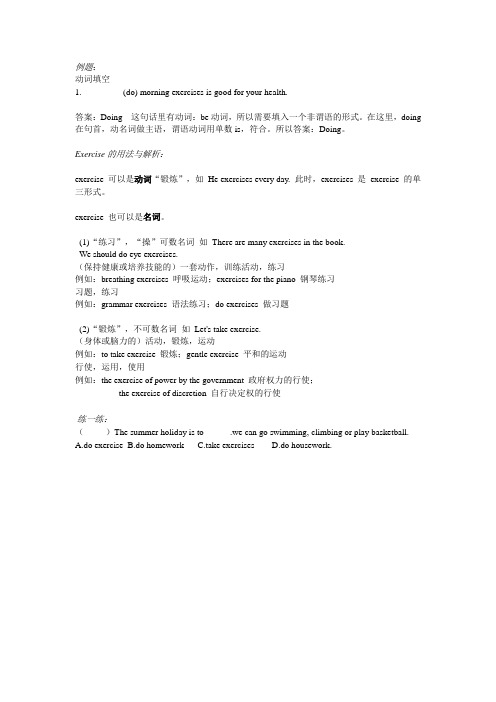
例题:动词填空1._______(do) morning exercises is good for your health.答案:Doing 这句话里有动词:be动词,所以需要填入一个非谓语的形式。
在这里,doing 在句首,动名词做主语,谓语动词用单数is,符合。
所以答案:Doing。
Exercise的用法与解析:exercise 可以是动词“锻炼”,如He exercises every day. 此时,exercises 是exercise 的单三形式。
exercise 也可以是名词。
(1)“练习”,“操”可数名词如There are many exercises in the book.We should do eye exercises.(保持健康或培养技能的)一套动作,训练活动,练习例如:breathing exercises 呼吸运动;exercises for the piano 钢琴练习习题,练习例如:grammar exercises 语法练习;do exercises 做习题(2)“锻炼”,不可数名词如Let's take exercise.(身体或脑力的)活动,锻炼,运动例如:to take exercise 锻炼;gentle exercise 平和的运动行使,运用,使用例如:the exercise of power by the government 政府权力的行使;the exercise of discretion 自行决定权的行使练一练:()The summer holiday is to______.we can go swimming, climbing or play basketball. A.do exercise B.do homework C.take exercises D.do housework.。
exercise的用法
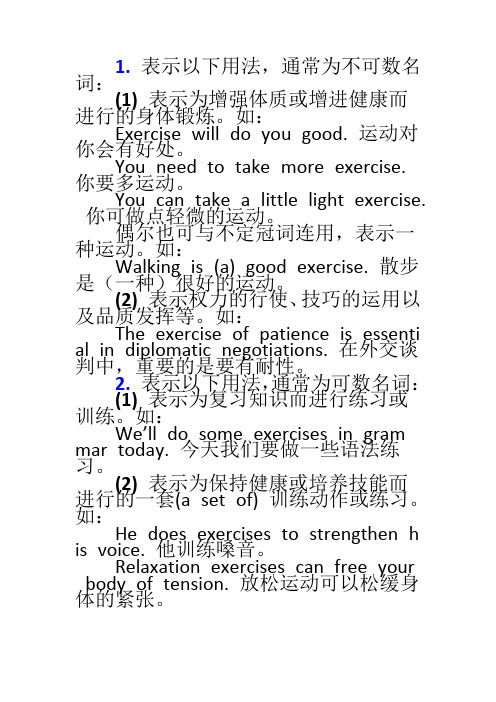
1.表示以下用法,通常为不可数名词:(1) 表示为增强体质或增进健康而进行的身体锻炼。
如:Exercise will do you good. 运动对你会有好处。
You need to take more exercise. 你要多运动。
You can take a little light exercise.你可做点轻微的运动。
偶尔也可与不定冠词连用,表示一种运动。
如:Walking is (a) good exercise. 散步是(一种)很好的运动。
(2) 表示权力的行使、技巧的运用以及品质发挥等。
如:The exercise of patience is essenti al in diplomatic negotiations. 在外交谈判中,重要的是要有耐性。
2.表示以下用法,通常为可数名词:(1) 表示为复习知识而进行练习或训练。
如:We’ll do some exercises in gram mar today. 今天我们要做一些语法练习。
(2) 表示为保持健康或培养技能而进行的一套(a set of) 训练动作或练习。
如:He does exercises to strengthen h is voice. 他训练嗓音。
Relaxation exercises can free your body of tension. 放松运动可以松缓身体的紧张。
(3) 表示为达到某特定结果而进行的活动。
如:3.表示“操练”“体操”“典礼”等,通常用复数形式。
如:We do morning exercises every d ay. 我们每天做早操。
Will you attend the graduation ex ercises 你将出席毕业典礼吗。
新标准大学英语(第二版)综合教程1答案截图及课文翻译U1分解

学习进程和记录•下表列出您已经完成的练习记录。
•灰色的表格单元(table cell)表示该单元无对应章节。
•红色感叹号(!)表示(您的老师设定的)需要计入教科书成绩的单元章节。
•红色方块标记()表示该练习为必答题。
•红色星号(*)表示该练习为客观题。
•打勾()表示您已完成的练习。
•表示老师批改后的成绩。
如果您的老师没有批改,主观题的缺省分值为0%,客观题的分值为系统自动打分。
•点击或可查看您该题的详细答题情况。
•单元平均成绩= 该单元计入教科书成绩的章节得分百分和/ 该单元需计入教科书成绩的章节总数。
•Unit 1Unit 2Unit 3Unit 4Unit 5Unit 6Unit 7Unit 8 Active reading 1First reading Task 1*100%***** First reading Task 2*100%Reading in detail: Vocabulary exercises Task 1 !*71%!*100%!*!*!*!*!*!*Reading in detail: Vocabulary exercises Task 2 !*100%!*89%!*!*!*!*!*!*Reading in detail: Vocabulary exercises Task 3 !*100%!*100%!*!*!*!*!*!*Reading in detail: Vocabularyexercises Task 4!*!*Active reading 2First reading Task 1**** First reading Task 2**Reading in detail: Vocabulary exercises Task 1 !*100%!*100%!*!*!*!*!*!*Reading in detail: Vocabulary exercises Task 2 !*75%!*80%!*!*!*!*!*!*Reading in detail: Vocabularyexercises Task 3!*!*!*!*Reading in detail: Vocabularyexercises Task 4!*Language in useTask 1**!***!* Task 2***!*Task 3!*Task 4!*Task 5!*78%*Task 6Task 7Task 8Task 9Guided writingWriting Task 1*** Writing Task 2Writing Task 3Unit testUnit test!*89%!*80%!*!*!*!*!*!*计入教科书成绩的章节数:7 6 10 8 9 6 7 8 单元平均成绩:87.6% 91.5%大一新生日记星期日1 从家里驱车经过一段疲惫的旅程才到达我住的宿舍楼。
exercise的使用方法与例子

exercise的使用方法与例子exercise的中文意思是锻炼,名词是练习;运动,训练;运用;那么exercise的使用方法你掌握了吗?以下是由店铺整理关于exercise的用法的内容,希望大家喜欢!exercise的用法exercise ['eksəsaiz]n. 运动;练习;运用;操练;礼拜;典礼vt. 锻炼;练习;使用;使忙碌;使惊恐vi. 运动;练习exercise的例子复数:exercises第三人称单数:exercises过去式:exercised过去分词:exercised现在分词:exercising1. 锻炼(身体),训练:to exercise the body锻炼身体to exercise one's strength锻炼体力2. 【军事】练(兵),操练 to exercise troops 训练军队 to exercise new recruits 训练新兵3. 驯(马、鸟等):to exercise a horse驯马to exercise one's birds驯鸟4. 练习,实习;训练[用作反身代词或被动语态]:She was exercised in virtue.她在培养品德。
5. (把能力、权力等)付之行动,付之实践,使用:to exercise freedom of speech实行言论自由6. (在行动或过程中)运用,显示出:to exercise judgement运用判断力to exercise caution显示出警惕性7. 行使,利用(权利、特权等):to exercise one's constitutional rights行使宪法规定的权利to exercise one's right as a citizen行使公民权利8. 发挥(作用),履行(职责、责任、诺言等);贯彻,执行,实行,完成(事业、任务、计划等):to exercise the duties of one's office履行职责to exercise a function履行职责9. 施加或产生(影响、作用),影响,发挥(威力):to exercise an influence on someone对某人施加影响It exercised a strong influence towards goodwill between the two great English speaking peoples.这件事对两个讲英语的伟大民族之间的友好亲善发挥了巨大作用。
Module6课时23Unit3Languageinuse及语法(教师版)九年级英语讲义

Module 6Unit 3Language in use 及语法目标导航重点短语 1.拒绝做某事2.积攒3.参加4.是否5.一个小角色6.因(不)做某事而警告某人重点句型 1.上课认真听,否则你将不知道要做什么。
Listen in class,or you will not understand.2.他们已经因他没有努力学习而警告他了。
They have him not working hard.3.我想参加今年学校的小提琴比赛,但是我不确定是否应该参加。
I want to the school violin petition this year,but I amnot sure I should.4.在学校话剧中,我获得了(演)主角(的机会),而琳达只得到一个小角色。
I have got in the school play,but Linda has only got asmall part.【答案】♦重点短语1.refuse to do sth.2.save up3.take part in4.whether...or not5.a small part6.warn sb.about (not) doing sth. ♦重点句型1.what to do2.warned;about3.take part in;whether;or not4.the biggest part知识精讲知识点01Eat your breakfast, or you will get hungry at school. 吃早餐,否则你在学校挨饿的。
【考点1】本句使用句型“祈使句+and/or+陈述句”,祈使句是陈述的条件,and意为“那么”,or意为“否则”。
如:Give me one more hour, and I’ll get the work finished. 再给我一个小时,我就会完成这项工作。
Hurry up, or you’ll miss the meeting. 如果你不快点,你就会错过会议。
- 1、下载文档前请自行甄别文档内容的完整性,平台不提供额外的编辑、内容补充、找答案等附加服务。
- 2、"仅部分预览"的文档,不可在线预览部分如存在完整性等问题,可反馈申请退款(可完整预览的文档不适用该条件!)。
- 3、如文档侵犯您的权益,请联系客服反馈,我们会尽快为您处理(人工客服工作时间:9:00-18:30)。
U14: Exercises for Period 1(P112)Ⅰ.While-listening:听填信息Boy Did you know that in Japan,children usually _____ to their teacher when he or she enters the classroom?Girl Yes,I know. It’s ______ to bow.Woman My Chinese friend says you shouldn't _____ someone a clock in China. Man Why not?Woman It’s bad luck,I think.Man Apparently in Saudi Arabia you shouldn’t give a toy dog ____ a present. In fact, you shouldn't give someone a card _____ a dog on it.Woman Really?Man Yes, it’s in this book I’m reading about Saudi Arabia.Boy Here in Turkey you shouldn't ____ your arms when you’re talking to someone? Girl Oh?Boy Yes, for Turkish people crossing your arms looks rude and unfriendly.Girl I’m going to Germany next month. Is there anything I should ___________? Boy Well, one thing: if someone invites you for dinner,you should _____ not to be late. It isn’t polite to come late.Girl Oh, OK. In England it’s ______ to arrive a bit late. But only about five or ten minutes.Man It says here that in Thailand you shouldn’t ______ the top of someone’s head. Woman That’s interesting.Man Apparently it’s not polite.Girl I want to buy a present for my Indian friend. What should I ______?Man Well, you shouldn’t get anything made of leather. For the Hindus in India,cows are sacred.Ⅱ.Post-listening:根据听力内容回答下列问题。
1 In Japan, what do students usually do when they come into the room?_________________________________________________________________2 What shouldn’t we do in Saudi Arabia?_________________________________________________________________3 What shouldn’t we do in Turkey when we ‘re talking to someone?_________________________________________________________________4 What should you do if someone invites you for dinner in Germany?______________________________________________________________5 What shouldn’t we do in Thailand?_________________________________________________________________6 What shouldn’t you get if you want to buy a present for your Indian friend?Why?__________________________________________________________________U14: Exercises for Period 1(P112-113)一、根据提示,用“ It is +形容词(如:polite、usual)+动词不定式(to do)”结构来造句。
ual,arrive,a bit late,in England____________________________________________2.interesting,at night ,watch stars _______________________________________3.exciting ,the football match,win ________________________________________4. difficult , a seat on a bus in the morning,find________________________________5.terrible ,see ,so much pollution, in the city___________________________________二、完成句子1.对学生来说,当他或她进入教室的时候向老师鞠躬是有礼貌的。
I t’s ________ for children to_____ _____ their teacher when he or she _______ the classroom.2.在中国你不应该送别人钟表作为礼物。
You __________ ________ someone a clock _____ a present in China.3.显然在沙特阿拉伯你不应该送别人玩具狗或带有狗的图画的卡片。
Apparently in Saudi Arabia you _________ give someone a toy dog or a card _______ a picture ofa dog.4.在土耳其当你和别人交谈的时候,你不应该交叉双臂,对土耳其人来说交叉双臂看起来粗鲁和不友好。
Here in Turkey you __________ _______ your arms when you’re ________ ______someone, for Turkish people ____________your arms looks _______ and ___________.5.当你去德国时,有件事你应该记住:如果有人邀请你去吃晚饭,你应该尽力不要迟到。
When you go to Germany, there is one thing you _______ __________: if someone _________ you ______dinner, you _______ ______ _______ _______ _______ _______.6.在英国晚到一点是很平常的。
In England it’s _______ _____ _______ _____ ______ ______.7.据说在泰国你不应摸别人的头顶。
It says here that in Thailand you _________ _______ ______ ______ _____ someone’s head.8.如果你要买一个礼物给你的印度朋友,你不应该任何牛皮制成的东西,因为牛是神圣的。
If you want to _____ a present _____ your Indian friend, you shouldn’t get anything _____ _____ _________ because cows are sacred.polite, cross, as, bow,friendly,custom,invite,with,leather,touch,try,shouldDifferent countries have different __________. In Japan, it’s ________ for children to_______ to their teacher whe n he or she enters the classroom. You shouldn’t give someone a clock _____ a present in China.Apparently in Saudi Arabia you _________ give someone a toy dog or a card_______ a picture of a dog. Here in Turkey you shouldn’t _______ your arms when you’re t alking to someone, for Turkish people crossing your arms looks rude and ___________. When yougo to Germany, there is one thing you should remember: if someone _________ you for dinner, you should _______ not to be late. But in England it’s usual to arrive a bit late. It says here that in Thailand you shouldn’t ______ the top of someone’s head. If you want to buy a present for your Indian friend, you shouldn’t get anything made of ______ because cows are sacred(神圣的).四、阅读理解Different countries have different customs in giving presents.In China you must never give a clock to a Chinese person, because the sound of the word for “clock” is similar to the sound of “death”. Also, don’t wrap (用……包裹) a present in white, black, or blue paper, because they are the colours for funerals (葬礼). Don’t give a knife, because something sharp can cut a friendship.In Russia if you give flowers as presents, you have to give an odd number of them (one, three, five, etc.) because even numbers of flowers are for funerals.In Germany if you are invited to dinner, flowers are good presents to take to your dinner hostess (女主人), but don’t take her red roses because it means you are in love with her. Don’t take thirteen of anything because it’s an unlucky number. Don’t take an ev en number of anything, either. Don’t wrap your presents in white, brown, or black paper.1. According to the passage, __________must never be given to Chinese people as presents.A. flowersB. clothesC. foodD. clocks2. People don’t wrap prese nts in black or white paper in__________.A. GermanyB. ChinaC. both China and GermanyD. both China and Russia3. What does the underlined word “even” mean in Chinese in the passage?A. 偶数的B. 奇数的C. 甚至D. 平坦的4. What presents can you take to your dinner hostess in Germany?A. Thirteen of something.B. Flowers except red roses.C. An even number of something.D. Something wrapped in brown paper.5. Which is the best title of the passage?A. Foreigners’ presen ts.B. Giving flowers as presents.C. Different customs in giving presents.D. Don’t give thirteen of anything as presents.Key:1—5 DCABCWhen in Rome, do as Romans do. 入乡随俗。
